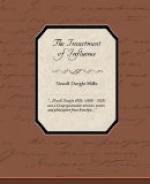To gain his vision of the hills of Paradise, Milton lost his vision of earth’s beauteous sights and scenes. In explanation of the early death of Raphael and Burns, Keats and Shelley, it has been said that few great men who are poor have lived to see forty. They bought their greatness with life itself. A few short years ago there lived in a western state a boy who came up to his young manhood with a great, deep passion for the plants and shrubs. While other boys loved the din and bustle of the city, or lingered long in the library, or turned eager feet toward the forum, this youth plunged into the fields and forests, and with a lover’s passion for his noble mistress gave himself to roots and seeds and flowers. While he was still a child he would tell on what day in March the first violet bloomed; when the first snowdrop came, and, going back through his years, could tell the very day in spring when the first robin sang near his window. Soon the boy’s collection of plants appealed to the wonder of scholars. A little later students from foreign countries began to send him strange flowers from Japan and seeds from India. One midnight while he was lingering o’er his books, suddenly the white page before him was as red with his life-blood as the rose that lay beside his hand. And when, after two years in Colorado, friends bore his body up the side of the mountains he so dearly loved, no scholar in all our land left so full a collection and exposition of the flowers of that distant state as did this dying boy. His study and wisdom made all to be his debtors. But he bought his wisdom with thirty years of health and happiness. We are rich only because the young scholar, with his glorious future, for our sakes made himself poor.
Our social treasure also is the result of vicarious service and suffering. Sailing along the New England coasts, one man’s craft strikes a rock and goes to the bottom. But where his boat sank there the state lifts a danger signal, and henceforth, avoiding that rock, whole fleets are saved. One traveler makes his way through the forest and is lost. Afterward other pilgrims avoid that way. Experimenting with the strange root or acid or chemical, the scholar is poisoned and dies. Taught by his agonies, others learn to avoid that danger.
Only a few centuries ago the liberty of thought was unknown. All lips were padlocked. The public criticism of a baron meant the confiscation of the peasant’s land; the criticism of the pope meant the dungeon; the criticism of the king meant death. Now all are free to think for themselves, to sift all knowledge and public teachings, to cast away the chaff and to save the precious wheat. But to buy this freedom blood has flowed like rivers and tears have been too cheap to count.




